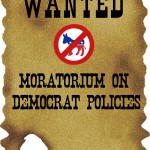Advertisement
 Conservative citizens showed up in force at a hearing on Thursday to protest a series of election regulations Democrat Secretary of State Ross Miller is proposing for the 2012 campaigns. For their trouble and concern, those citizens were roundly criticized and ridiculed by Miller’s office for daring to raise objections at the public hearing.
Conservative citizens showed up in force at a hearing on Thursday to protest a series of election regulations Democrat Secretary of State Ross Miller is proposing for the 2012 campaigns. For their trouble and concern, those citizens were roundly criticized and ridiculed by Miller’s office for daring to raise objections at the public hearing.
“It is unfortunate that these individuals apparently haven’t taken the time to fully read the proposed regulations or completely digest their impact,” Deputy Secretary of State Bob Walsh told Sean Whaley of the Nevada News Bureau.
Mr. Walsh’s claim that these concerned citizens didn’t take the time to read the proposed regulations is a load of flapdoodle. But if they DID have difficulty digesting and understanding them, they could surely be excused.
The regulations are based on three omnibus bills – AB81, AB82 an AB100 – which were passed by the 2011 Legislature – all three of which which GROSSLY exceed what could even remotely be considered a single-subject as is supposedly required by our Constitution. But that’s another issue for another day.
Just get a load of what Mr. Walsh and Mr. Johnson think we average Nevada citizens are supposed to read and understand before we voice concerns over new regulations we are rightfully and understandably suspicious of.
The following is just the SUMMARY of one of the three bills – which includes 69 separate sections spread out over 55 pages.
(Click here to read the full bill)
_ _ _ _ _ _ _ _ _ _ _ _ _ _ _ _ _ _ _ _ _ _
Assembly Bill No. 81–Committee on Legislative Operations and Elections
CHAPTER……….
AN ACT relating to elections; clarifying how a minor political party may be organized; revising certain requirements for petitions of referendum; revising provisions relating to counting ballots, posting voting results and recounts; providing that the residency of spouses of certain military personnel is not changed whether absent or present in this State; making various changes concerning campaign contributions and expenditures; making various other changes to provisions governing elections; providing a penalty; and providing other matters properly relating thereto.Legislative Counsel’s Digest:
In order to qualify to place the names of candidates on the ballot, under existing law, a minor political party must have filed with the Secretary of State a certificate of existence and a list of candidates. Also, the minor political party must have: (1) at the last preceding general election, polled for any of its candidates for partisan office a number of votes equal to or more than 1 percent of the total number of votes cast for the offices of Representative in Congress; (2) been designated as the political party on the applications to register to vote of at least 1 percent of the total number of registered voters in this State; or (3) filed a petition with the Secretary of State which is signed by a number of registered voters equal to at least 1 percent of the total number of votes cast at the last preceding election for the offices of Representative of Congress. Alternatively, the minor political party may place the name of a candidate on the ballot if the minor political party has filed with the Secretary of State a certificate of existence and a petition on behalf of the candidate that it wants to place on the ballot containing a certain number of signatures. (NRS 293.1715) Sections 16, 16.2 and 16.4 of this bill remove the option of a minor political party to place a candidate on the ballot by filing a petition on behalf of the candidate. Sections 6 and 15-18 of this bill clarify that an organization is organized as a minor political party when it files a certificate of existence. A minor political party must still meet the other requirements in order to qualify to place candidates on the ballot.
Sections 7-12 and 64 of this bill provide that the signature and verification requirements for initiative petitions also apply to petitions for referendum. Existing law provides the requirements for nominating candidates for office and placing candidates on the ballot for the general election. (NRS 293.165, 293.166, 293.368) Sections 13, 14 and 25 of this bill move the date after which no change may be made on the ballot for the general election from the first Tuesday after the primary election to the fourth Friday in June of the year in which the general election is held.
Existing law provides that if a person willfully files a declaration or acceptance of candidacy that contains a false statement, the name of the person must not appear on the ballot for the election for which the person filed the declaration or acceptance of candidacy. (NRS 293.184, 293C.1865) Sections 19 and 32 of this bill further require that if the name of such a person appears on the ballot because the deadline for making changes to the ballot has passed, the Secretary of State, county clerk or city clerk must inform voters by posting signs at polling places that the person is disqualified from entering upon the duties of office.
Section 21 of this bill allows a person to cast a primary ballot for a major political party only if the person is a member of that major political party. Existing law sets forth procedures for depositing absent ballots in the ballot box, including verifying the absent voter’s signature that appears on the back of the return envelope or facsimile. (NRS 293.333, 293C.332) Because certain military personnel and overseas citizens may return special absent ballots via approved electronic transmission other than facsimile, sections 23 and 33 of this bill authorize the verification of the signature of these voters by comparing the signature from the special absent ballot or the oath of the voter that must be included in the special absent ballot with that on the original application to register to vote.
Existing law sets forth the period for early voting by personal appearance at a primary or general election, which excludes Sundays and state and federal holidays. (NRS 293.3568, 293C.3568) Sections 24 and 34 of this bill provide that state holidays are not excluded from that period.
Section 26 of this bill prohibits a county clerk from posting voting results for a statewide or multicounty race or ballot question until the Secretary of State notifies the county clerk that all polling places are closed and all votes have been cast.
Section 27 of this bill revises the procedure for demands for an election recount in a county or city using a mechanical voting system and for recounts affecting more than one county.
Existing law provides that a person does not gain or lose residence in the State by reason of his or her presence or absence while being employed in the military, naval or civil service of the United States or the State of Nevada or while engaged in the navigation of the waters of the United States or of the high seas. (NRS 293.487) Section 30 of this bill provides that the spouse of such a person also does not gain or lose residence in the State.
Sections 36.5 and 39.5 of this bill differentiate between “campaign expenses” and “expenditures” for purposes of campaign reporting requirements.
Section 37 of this bill requires certain persons, committees for political action, political parties and committees of political parties that expend more than $100 for the purpose of financing certain public communications to disclose on the communication the name of the person, committee or political party that paid for the communication.
Section 41.5 of this bill prohibits a person from making a contribution to a committee for political action with the knowledge and intent that the committee for political action will contribute that money to a specific candidate which, in combination with the total contributions already made by the person for the same election, would violate the limitations on contributions in existing law.
Section 49 of this bill provides that if a committee for political action fails to register with the Secretary of State before engaging in any activity within the State, the Secretary of State may impose on the committee a civil penalty for each time the committee engages in activity without being registered.
Sections 40, 44, 45, 47, 48, 50-53, 55, 59-62 and 69 of this bill repeal the term “business entity” and remove the term from provisions governing registration and campaign contribution and expenditure reporting. These entities, however, are not exempt from the provisions because they are business organizations included within the term “person” as defined in existing law. (NRS 294A.009)
Section 54 of this bill: (1) prohibits a candidate or public officer from using campaign contributions to pay civil or criminal penalties; and (2) authorizes a candidate or public officer to use campaign contributions to pay for legal expenses that the candidate or public officer incurred in relation to a campaign or while serving in public office. Any such candidate or public officer is not required to establish a legal defense fund in order to use campaign contributions to pay for legal expenses, but sections 29, 54, 56, 58, 59, 61 and 62 of this bill require the candidate or public officer to report the expenditure of such money on his or her campaign expenditure reports.
Section 58 of this bill adds contributions made to another candidate, a nonprofit corporation, a committee for political action or a committee for the recall of a public officer to the categories of expenditures that must be reported on campaign expenditure reports.
Section 65 of this bill requires the affidavit executed by a circulator of a petition for initiative or referendum to include the contact information of the circulator and a statement that the circulator is at least 18 years of age.
Sections 65.5 and 66 of this bill: (1) clarify that a candidate for or person appointed to the office of Legislator is required to file a statement of financial disclosure with the Secretary of State; and (2) requires a public officer who leaves office to file a statement of financial disclosure on January 15th of the year immediately following the year in which the public officer leaves office unless the public officer leaves office before January 15 in the prior year.
Sections 67 and 68 of this bill require that candidates for city office in the cities of Carlin and Wells file declarations of candidacy at the same time as candidates for statewide office.
_ _ _ _ _ _ _ _ _ _ __ _ _ _ _ _ _ _ _
Frankly, I think Mr. Walsh and Ross Miller owe “those individuals” who have let their voices of concern be heard over this monstrosity an apology!
In fact, the Nevada Legislature also owes the citizens of Nevada an apology for passing this thing. By my calculation, this AB81 mama-jama weighs in at over 22,000 often-impossible-to-understand words…while the United States Constitution – which governs the entire nation and federal government – only had “4,543 words in the original, unamended Constitution, including the signatures,” according to USConsitution.net.
Hell, just the legislative summary digest (above) of the bill is 1,394 words long. The SUMMARY!
This whole thing is absurdity taken to an extreme. It’s obscene. Enough already.
Advertisement
Subscribe Free By Email

Looking for the best in breaking news and conservative views? Let Chuck do all the work for you! Subscribe to his FREE "Muth's Truths" e-newsletter.


